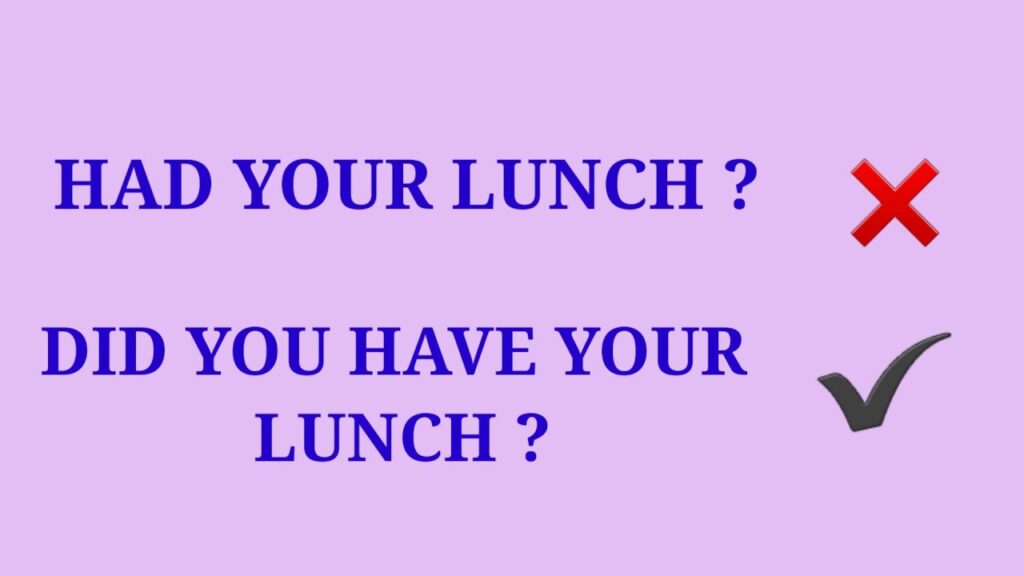What is the meaning of having lunch?
to eat a meal in the middle of the day: lunch with sb I’m lunching with Giles.
Is it correct to have your lunch?
“Had your lunch?” Is an incomplete sentence, and colloquial, but correct in an informal situation. “Have you taken lunch” or “Did you take lunch” is very foreign. You should try not to translate too directly from your own language. The most correct would be: “have you had lunch (yet)?”
How do you reply to had your lunch?
This is an Expert-Verified Answer Have you had lunch?” is the same as “Did you eat lunch?” You can say, “Yes, I had lunch.” or “Yes, I ate lunch.” OR “No, I didn’t have lunch.” or “No, I didn’t eat lunch.” If you’ve had lunch, say ‘yes’.
What does lunch mean in slang?
slang : out of touch with reality.
What is lunch in slang?
out to lunch, Slang. not paying attention or tending to business; negligent: You must have been out to lunch when you wrote that weird report.
Have my lunch or take my lunch?
When we use have, it means to eat lunch. When we use take, it means to use one’s meal or rest period at work.
What does had your dinner mean?
It is a question asking whether the dinner has already been had or taken.
How do you respond to had tea?
You could respond in either of these ways with a question back at them: “Yes, I had. Did you?” or “Yes, I had. How about you?” or “Yes.
Did you have your lunch Meaning?
On the other hand “Did you have your lunch?” is asked especially on a later date, or a timeframe, when the person has already passed that situation not just now, but sometime ago, for e.g. 3–4 days ago. It basically relates to something that has already happened quite sometime ago.
How do you ask someone if they have lunch?
Have you had your lunch?
What does have your food mean?
Yes, it’s correct. It means that all people have to eat in order to survive.
Have a lunch vs have lunch?
We use the expression “have lunch” (not “have a lunch”). However, when using an adjective or a compound noun, we add a determiner (typically the article “a”) before the noun. We use the expression “have lunch” (not “have a lunch”). We had lunch before going to the office.
Why is it called lunch?
“Lunch was a very rare word up until the 19th Century,” he says. One theory is that it’s derived from the word “nuncheon”, an old Anglo-Saxon word which meant a quick snack between meals that you can hold in your hands. It was used around the late 17th Century, says Yeldham.
Why is lunch important?
Lunch is an important meal for everyone. It provides energy and nutrients to keep the body and brain working efficiently through the afternoon. A packed lunch made at home can be a healthy and delicious choice and gives you control over the foods and ingredients included.
What is a dry lunch in slang?
dry lunch (plural dry lunches) A lunch that is not accompanied by alcohol. (England, slang) A contemptible or uncool person quotations ▼
What is slang for dinner?
repast. He proclaimed it a splendid repast. blowout (slang) collation. nosh-up (informal)
Why is it called lunch?
“Lunch was a very rare word up until the 19th Century,” he says. One theory is that it’s derived from the word “nuncheon”, an old Anglo-Saxon word which meant a quick snack between meals that you can hold in your hands. It was used around the late 17th Century, says Yeldham.
What is a slang word for food?
What is the difference between having and eating?
The verb “have” is transitive. That means we must always say what we ate or will eat. For instance, in the restaurant exchange, the man said they would have the oatmeal. “Eat” is intransitive, which means we do not have to say it.
Why is it important to have a lunch break?
So why is it important to take a lunch break? Recharge your brain’s capacity – by giving your brain time to rest and recharge, your coping abilities will increase, as will your emotional intelligence, decision-making skills, memory and focus.
Have you eat or have you eaten?
The correct expression is “Have you eaten?” This is due to the fact that the auxiliary verb “to have” is followed by the past participle of the base verb, for example, in this case, “eat.” While, indeed, the base-verb is “eat,” the past participle of the verb”eaten” is called a lexical verb.









